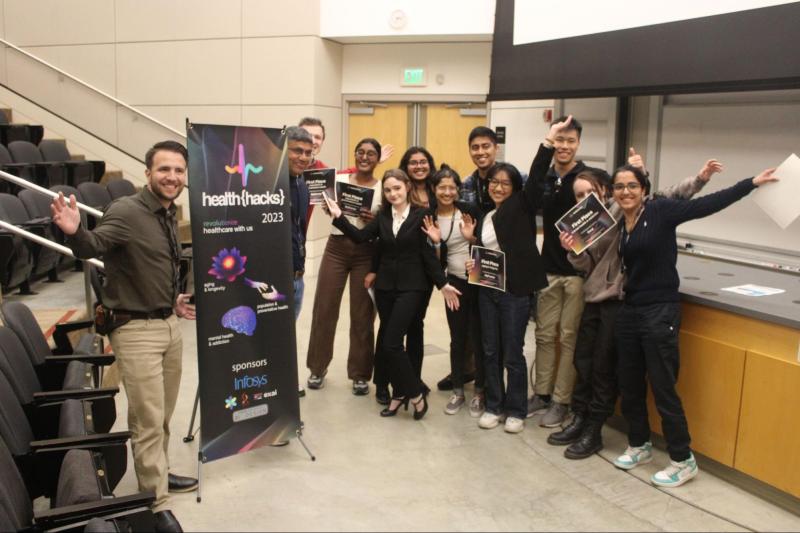About a hundred students from UC Berkeley and Stanford met at the Engineering Quad last weekend to design innovations for the future of healthcare for the fourth annual health{hacks}. Each participant had 48 hours to design a project aimed at addressing the most critical challenges facing public health and biodesign.
health{hacks} debuted in 2020 as a virtual hackathon geared towards finding interdisciplinary solutions to the COVID-19 pandemic and has since become an organization under Stanford. In the years since, health{hacks} has expanded to invite all kinds of healthcare-related projects, hosting a total of over a thousand participants at its events in the years since.
This year’s projects were split into three tracks: “aging and longevity,” “population and preventive health” and “mental health and addiction.” On the final day of the hackathon, teams pitched their innovations to a panel of judges of industry experts, who then picked the top three projects in each track.
The event gave participants an opportunity to work with mentors and experts in the healthcare field.
Ananya Goyal, a third-year bioengineering Ph.D. student at Stanford, said that the guidance she received from these mentor workshops was one of her favorite parts of the event. Goyal worked with Trishia Chemaly, a fourth-year bioengineering Ph.D. student at Stanford, to develop a virtual reality environment to help treat osteoarthritis without the costs of physical therapy.
Goyal said that she and Chemaly are considering pursuing the project beyond health{hacks}: “We’ve gotten positive feedback from mentors about maybe taking this further… there’s potential in our product that they helped us develop,” she said.
Chemaly added that they want to “do more research so that we are more sure about the accuracy and the validity of our invention.”
Samiha Singh, a junior from UC Berkeley, said that she and her team members slept overnight at the Engineering Quad because of how committed they were to their project. “I think our team happened to work very well because we all had a very personal connection to the issue we were exploring. We all wanted to find a solution,” she said.
Singh’s team set out to create a mobile app to help college students manage anxiety and make tangible lifestyle changes to improve their wellbeing. Diana Poplacenel, a sophomore from UC Berkeley and one of Singh’s teammates, said that the team thought of the idea because “college students need something that is created for them and their needs, unlike most user interfaces that are unfriendly for them.”
Poplacenel and Singh’s team decided to temporarily name their app “Coral,” which according to Singh, “relates to water and nature, something that is very calming for all of us.”
On the final day of the hackathon, the teams gathered in Hewlett Teaching Center as judges announced the winners for each track.
Poplacenel and Singh’s team’s app Coral won first place in the “mental health and addiction” category.
William Pan ’25, who co-founded health{hacks} before coming to Stanford, called the event a “resounding success.” He said that the organizers were “thrilled to witness the birth of truly groundbreaking ideas that are not only technically feasible but also possess strong go-to-market strategies.”
Adrian Smith ’26, the Vice President of Operations, told The Daily that health{hacks}’s most challenging obstacles this year involved securing sponsorships, advertising and contacting judges and mentors. However, he said, he and the rest of his team “couldn’t be happier with the end result.”
“I’d encourage anyone to join [the health{hacks}] team next year, as your eyes will be opened to the future of innovation driven by young people just like us,” Smith said.
The next health{hacks} event will be hosted in Los Angeles from Aug. 4 to Aug. 6.
